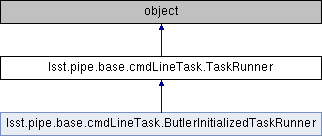Run a command-line task, using multiprocessing if requested. More...

Public Member Functions | |
| def | __init__ |
| Construct a TaskRunner. More... | |
| def | prepareForMultiProcessing |
| Prepare this instance for multiprocessing by removing optional non-picklable elements. More... | |
| def | run |
| Run the task on all targets. More... | |
| def | makeTask |
| Create a Task instance. More... | |
| def | precall |
| Hook for code that should run exactly once, before multiprocessing is invoked. More... | |
| def | __call__ |
| Run the Task on a single target. More... | |
Static Public Member Functions | |
| def | getTargetList |
| Return a list of (dataRef, kwargs) to be used as arguments for TaskRunner. More... | |
Public Attributes | |
| TaskClass | |
| doReturnResults | |
| config | |
| log | |
| doRaise | |
| clobberConfig | |
| numProcesses | |
| timeout | |
Static Public Attributes | |
| int | TIMEOUT = 9999 |
Detailed Description
Run a command-line task, using multiprocessing if requested.
Each command-line task (subclass of CmdLineTask) has a task runner. By default it is this class, but some tasks require a subclass. See the manual "how to write a command-line task" in the pipe_tasks documentation for more information. See CmdLineTask.parseAndRun to see how a task runner is used.
You may use this task runner for your command-line task if your task has a run method that takes exactly one argument: a butler data reference. Otherwise you must provide a task-specific subclass of this runner for your task's RunnerClass that overrides TaskRunner.getTargetList and possibly TaskRunner.__call__. See TaskRunner.getTargetList for details.
This design matches the common pattern for command-line tasks: the run method takes a single data reference, of some suitable name. Additional arguments are rare, and if present, require a subclass of TaskRunner that calls these additional arguments by name.
Instances of this class must be picklable in order to be compatible with multiprocessing. If multiprocessing is requested (parsedCmd.numProcesses > 1) then run() calls prepareForMultiProcessing to jettison optional non-picklable elements. If your task runner is not compatible with multiprocessing then indicate this in your task by setting class variable canMultiprocess=False.
Due to a python bug [1], handling a KeyboardInterrupt properly requires specifying a timeout [2]. This timeout (in sec) can be specified as the "timeout" element in the output from ArgumentParser (the "parsedCmd"), if available, otherwise we use TaskRunner.TIMEOUT_DEFAULT.
[1] http://bugs.python.org/issue8296 [2] http://stackoverflow.com/questions/1408356/keyboard-interrupts-with-pythons-multiprocessing-pool)
Definition at line 99 of file cmdLineTask.py.
Constructor & Destructor Documentation
| def lsst.pipe.base.cmdLineTask.TaskRunner.__init__ | ( | self, | |
| TaskClass, | |||
| parsedCmd, | |||
doReturnResults = False |
|||
| ) |
Construct a TaskRunner.
- Warning
- Do not store parsedCmd, as this instance is pickled (if multiprocessing) and parsedCmd may contain non-picklable elements. It certainly contains more data than we need to send to each instance of the task.
- Parameters
-
TaskClass The class of the task to run parsedCmd The parsed command-line arguments, as returned by the task's argument parser's parse_args method. doReturnResults Should run return the collected result from each invocation of the task? This is only intended for unit tests and similar use. It can easily exhaust memory (if the task returns enough data and you call it enough times) and it will fail when using multiprocessing if the returned data cannot be pickled.
- Exceptions
-
ImportError if multiprocessing requested (and the task supports it) but the multiprocessing library cannot be imported.
Definition at line 130 of file cmdLineTask.py.
 1.8.5
1.8.5